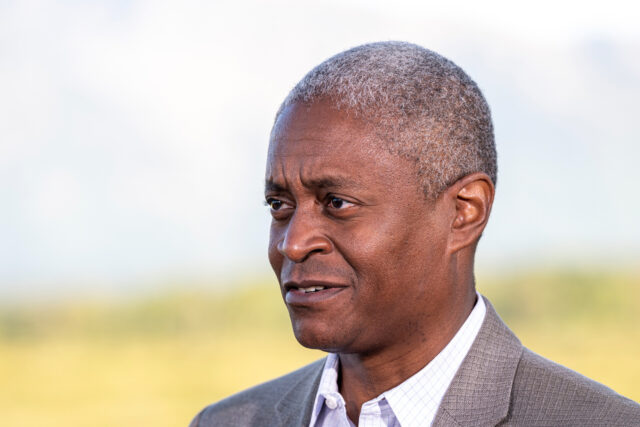The Federal Reserve has no choice but to work to bring down demand because the U.S. economy has proved incapable of a supply-side recovery, said Federal Reserve Bank of Atlanta President Raphael Bostic on Sunday.
“When you think about its source, it’s because we have very high demand. We have not enough supply. And as long as you have that gap, prices are going to be feeling upward pressure. So we’ve got to narrow that gap,” Bostic said in an interview with CBS’s Face the Nation program. “What we were hoping would happen is that we would see some movement on the supply side to move the supply up so there wasn’t so much of an auction of goods that are on the marketplace. But that hasn’t happened. And that really has meant that we have to turn to our policies to try to take demand down.”
The Federal Reserve has raised its interest rate target five times this year, from near zero to above three percent. At each of the past three meetings of the Federal Open Market Committee, the Fed raised its target by 75 basis points. This is the fastest rate of hikes in decades but monetary policy famously acts with a long and variable lag on the economy. Although inflation tumbled in July, it accelerated in August and measures of underlying inflationary pressure suggest prices will keep rising at a very fast tate.
“Inflation is high. It’s too high. And we really need to do all that we can to make it come down,” Bostic said.
Initial hopes that the Fed could engineer a so-called “soft-landing”—a reduction of inflation without a rise in unemployment or too big of a slump in economic activity-— were in part a bet that a recovery of supply chains would slow inflation. China’s zero covid policy shutdowns and Russia’s invasion of Ukraine have created new supply side challenges. As well, progress at supply bottlenecks such as the ports has brought less relief from inflation than Fed officials expected.
Now Fed officials acknowledge that the economy will have to slow and demand for labor will have to be reduced to get inflation under control. This will likely mean that the unemployment rate will rise from the 3.5 to 3.7 percent range it was in this summer.
“We need to have a slowdown. There’s no question about that. But I do think that we’re going to do all we can at the Federal Reserve to avoid deep, deep pain. And I think there are some scenarios where that is likely to happen,” Bostic said on Sunday. “It’s going to be hard. It’s not going to be easy. There will likely be some job losses.”
Stocks have fallen sharply on fears that the Fed’s rate hikes will push the economy into a recession, hurting corporate profits and sales. The S&P 500 is down by 5 percent over the past five days. Year to date, the broad index of large U.S. companies is down 23.38 percent.

COMMENTS
Please let us know if you're having issues with commenting.